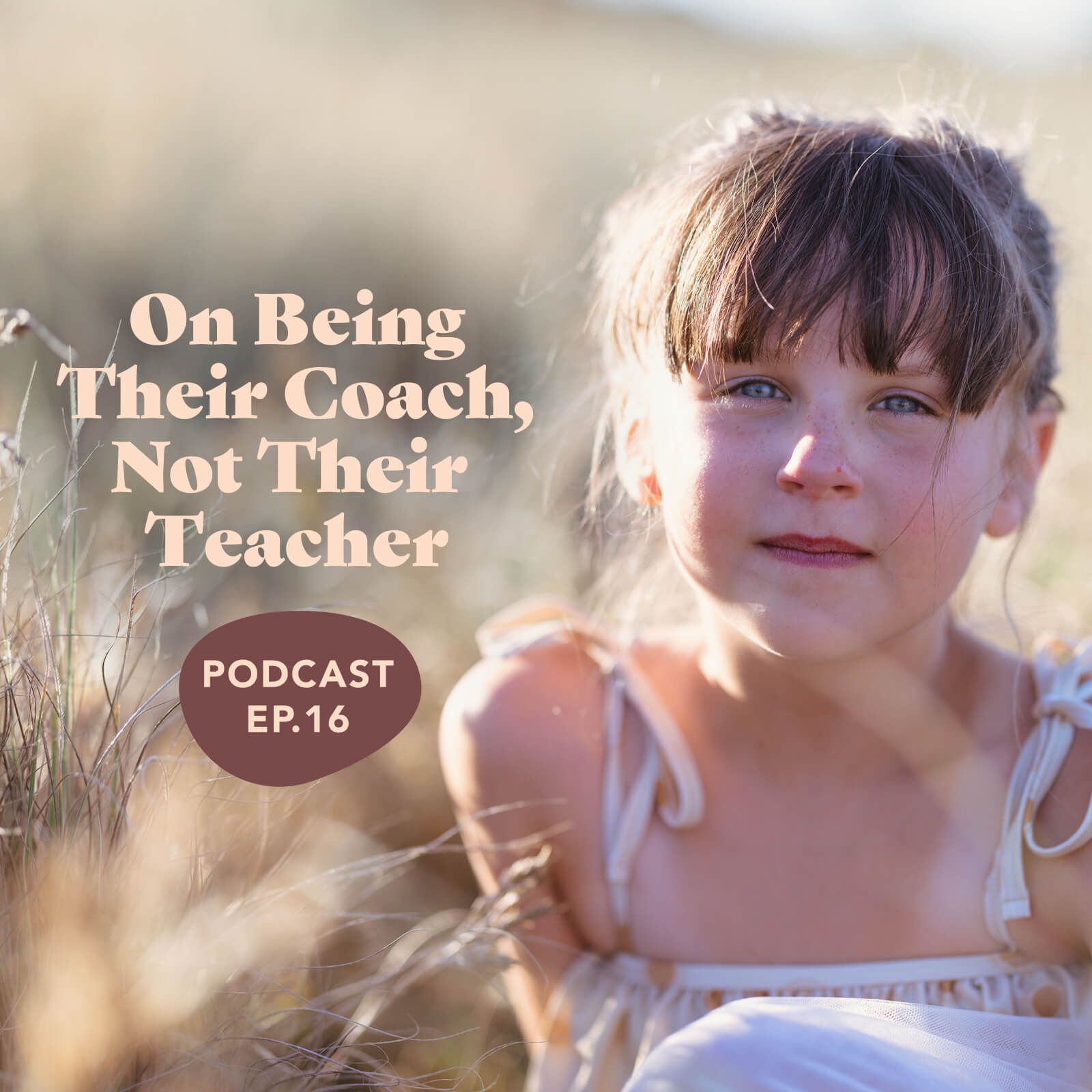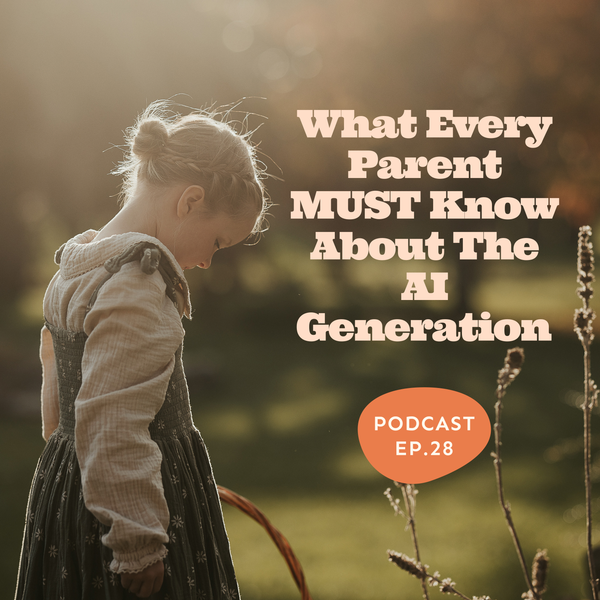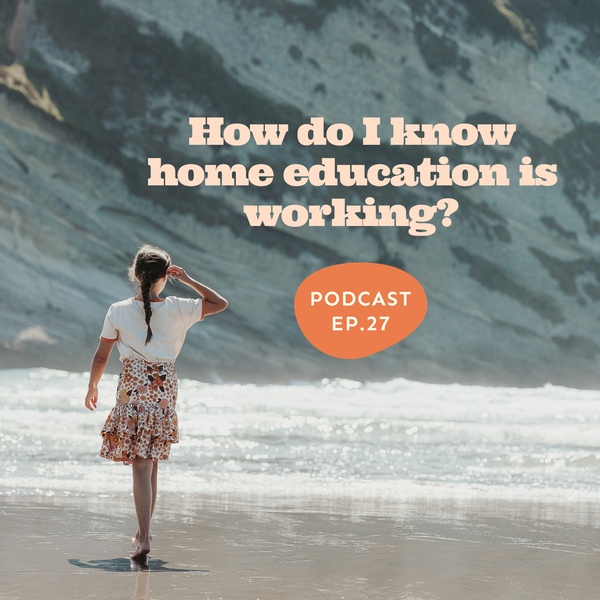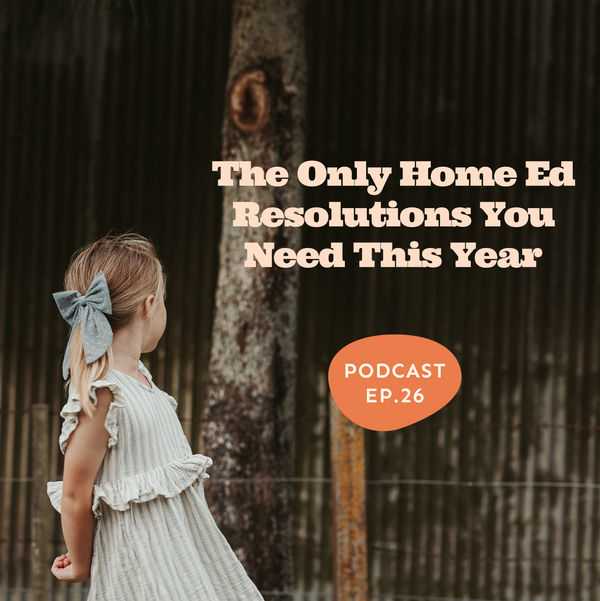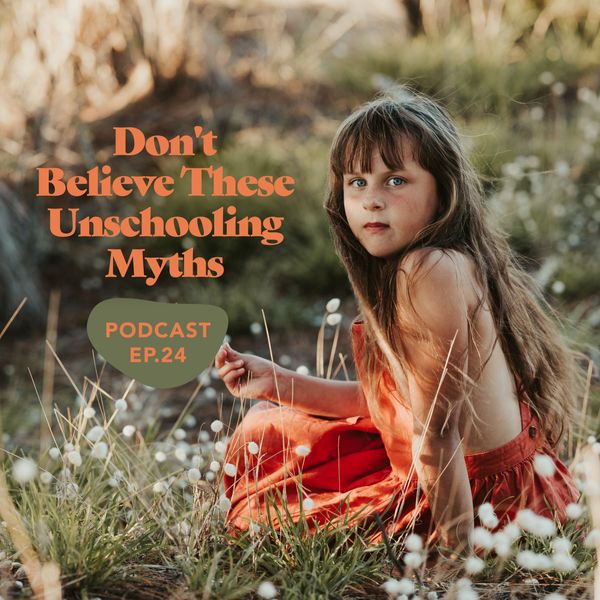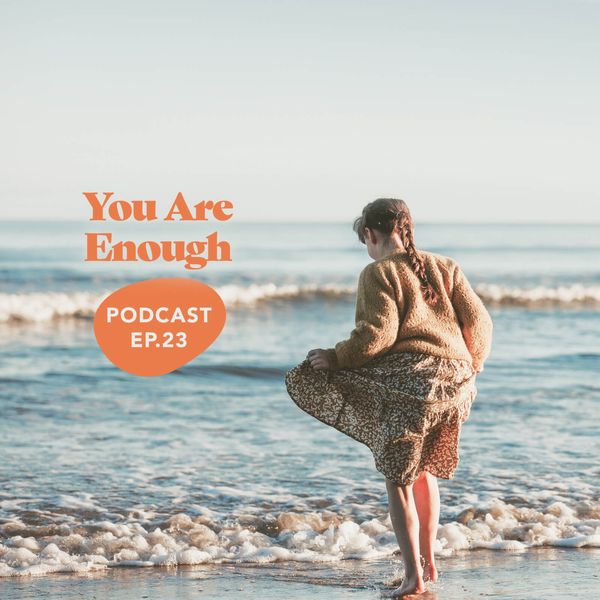Today, I want to talk about why I believe it’s so important that we – as home educating parents – play the role of coach, and mentor, and guide to our children. I want to take you through the simple, but powerful, framework Kate and I have used to help our children discover, explore, and run with their passions. And I want to talk about some related things, like perseverance and failure.
I’m SO excited to have this conversation. I’ve been sent a lot of messages about this kind of thing over the years, from parents who truly want the best for their children but who haven’t quite been able to help them become the passionate, self-driven explorers they hoped they would.
So, I really hope this conversation speaks to the feelings, and the struggles, and the genuine care and hope that those messages are born from. And, that it gives you a good mix of inspiration, and reflection, and tangible action.
These private episodes go even deeper, backed by research, the science of how children learn and grow, and more than a decade of lived home educating experience. Each one is designed to help you rethink, reframe, and recalibrate the way you're walking this path, giving you the confidence to live the version of life you want. The Collection is 23 episodes strong and counting, with over 10 hours of listening available right now.
As a subscriber, you'll also get immediate access to my self-paced course, expert-led masterclasses recordings, five downloadable guides, our school exemption documents, and more 💛
Show Notes
Learning from Errors – Annual Review of Psychology
“Experimental investigations indicate that errorful learning followed by corrective feedback is beneficial to learning.”
Sir Ken Robinson – Wikipedia
Do Schools Kill Creativity? – a classic (and funny!) TED Talk from Sir Ken
Complete Transcript
INTRO
Helloooo and welcome to the Life Without School podcast, here to help you and your children live the life you want to, not just the one you’re told you should.
I’m Issy, a writer and home educating dad from New Zealand.
You can find my work at starkravingdadblog.com – all of my posts, podcast episodes, and short films created to encourage, support and reassure anyone walking this road less travelled.
Thank you so much for tuning in to listen today. Alright, let’s get into this week’s episode.
MUSIC
Hello there, thanks for tuning in today for what I think is going to be my favourite conversation yet.
Back in episode 12 – which was one of my monthly Q&A episodes – I answered a question about motivating children. And I briefly shared some starting thoughts on how to encourage your child to find their interests, and spend time in them.
Today, I want to dedicate a whole episode to that. I want to talk about why I believe it’s so important that we – as parents – play a role of coach, and mentor, and guide to our children. I want to take you through the simple, but powerful, framework I’ve used to help my children discover, explore, and run with their passions. And I want to talk about some areas that are related to these conversations, like perseverance and failure.
We talk about a lot of things, in home education – we talk about curriculums, and resources, and modules, and the physical spaces we’re setting up, and what we’re printing out this morning, and what our schedule looks like today, and this week…and all of that sort of stuff is fine…but it’s all very external. And, through my own experiences, and Kate’s experiences – I’m a firm believer that you won’t know what layers to add to your home educating life until you start deeply tuning in to your child.
And you can’t do that until you understand your role, and how you’ll go about helping your child become the best version of themselves. To grow in ways they truly want to, and were born to.
I can promise you that giving focus to your role, as a parent, will have a huge impact on your home educating environment. It can be the difference between a journey that’s a bit directionless and frustrating, and one where your child is going deep into things they’ve discovered. One where they’re getting better and better at things they’re good at. One where they’re on a journey they’re leading, and are motivated to be on.
Of all the things I love about living a life without school, getting to be the coach and mentor that stands firmly in my children’s corner through their formative years is at the top of my list. Children usually have various people in their lives who play that role at different times, of course – aunties and uncles, grandparents, teachers and coaches from their clubs and sports teams, even their siblings and friends. But as a parent…you are uniquely placed to encourage and guide them. You are probably the person who knows them better than anyone. You’ve probably watched them grow since literally the moment they were born. You’ve probably seen them at their highest, and at their lowest. And you probably have more insight into who they are, and how they can best start exploring that deeply, more so than anyone else on the planet.
I’m…so excited to have this conversation. I’ve been sent a lot of messages about this kind of thing over the years, from parents who truly want the best for their children but who haven’t quite been able to help them become the passionate, self-driven explorers they hoped they would.
So, I really hope this conversation speaks to the feelings, and the struggles, and the genuine care and hope, that those messages are born from. And, that it gives you a good mix of inspiration, and reflection, and tangible action.
Right, lace those shoes up. It’s time to coach.
First, though, just while you’re lacing up there, why do I believe it’s so important to really lean in to coaching and mentoring our children? Why is it not enough to just focus on the education you’re trying to deliver, the resources you’ll need, and then get on with whatever learning that plan says should happen.
Well, because I believe that all human beings have talents, and passions, and dreams within them. That we are born with natural capacities for certain things (a lot of things, actually), but that they become buried within us if we move through life without spending time accessing them.
And I believe it is the role of any key educator involved in a child’s life – whether that’s parents, or teachers, or relatives – whoever – to laser in on helping them access those talents and abilities, to practice them, to test and refine them, to develop them, and to grow them into lifelong passions and a sense of meaning and contribution to the world. And, ultimately, a deep and rich sense of self.
But education, typically, does not do this. And that’s because we separate education from a child, almost entirely. It is something that’s external to them. We have topics, and subjects, and modules, and learning plans, and assessments, and expectations…and usually, none of that relates very much at all to who the child actually is. If it does, it’s by chance not design.
Over here, on the right, we have education. And over here, on the left, we have a child. And we take that education, and we deliver it across to the child, we push it across to the child, and expect them to receive it.
But this is where our problems of a lack of motivation, and drive, and discovery, and interest begin. Because a good education isn’t something that’s separate from a child. It’s something that’s already *within* a child. Something that is drawn out of them as the right person – or people, actually, throughout their life – help them access it, process it, and develop it.
To show you what I mean – and to help me set the scene on why I think it’s so important to put energy into making sure we’re the coach our child needs – I’m going to take one of the great Sir Ken Robinson’s stories and share it here. It so beautifully illustrates the scenario of a child knowing who they are deep down, but not really being able to see it, or express it yet. Not being able to explain it, or even understand it. You’ll see here how important it was for the child in this story to have the right mentors around her at the right time, and how differently her life would have been had she not.
If you don’t know who Sir Ken Robinson is, please look him up. He passed away a couple of years ago, far too young, but not before he’d blazed a bright trail of respect and change for children – especially those who don’t fit inside the box. His most famous TED talk – which has an absurd number of views, I think it’s still the most watched Ted Talk ever – is called Do Schools Kill Creativity. If you’ve never seen it, it’ll be one of the best 20 minutes you’ll ever invest in yourself. But don’t stop there. Ken Robinson published a number of books, and they’re all worth your time.
But this story he tells. I love it so much. It’s about an 8 year old girl called Gillian, in the 1930s. And, by all accounts, her school life was a bit of a mess. She performed horribly on every standard measure within education – her handwriting, the quality of her assignments, her test results…they were all poor. But more than that, even just her physical presence in the class was a problem. She moved too much, she was distracted too often, and she was disrupting the flow of the classroom.
It came to a head with a letter the school wrote her parents, which spoke of their concern for her ability to learn and function as a normal child. Her parents, naturally concerned, took her straight to a psychologist for assessment.
In the psychologist’s office, Gillian sat listening to a man in a tweed suit speak to her mother. She was nervous. She knew this conversation, and the opinion this man would form of her, would have a big impact on her life. She sat on her hands. She tried not to fidget.
After 20 long minutes of discussion, the man walked across to Gillian and told her that he and her mother needed a few quiet moments to talk privately. As the two adults left the room, the psychologist flicked on a radio. He closed the door, but there was a window into the room. He told Gillian’s mother to stand just to the side of it, out of sight, but to watch, and to wait.
She didn’t need the waiting bit. Gillian was already on her feet. She was moving around the room to the music, dancing, her face lit up with joy.
The psychologist looked at Gillian’s mother and said a few short words that would change that little girl’s life. “Gillian isn’t sick, Mrs Lynne. She’s a dancer. Take her to a dance school.”
And so she did. From there, she eventually went on a journey through the Royal Ballet School in London, joined the Royal Ballet Company itself, performed around the world as a soloist, started her own musical theatre company, and – after teaming up with Andrew Lloyd Webber – helped create hugely important and successful musical theatre productions like Cats and The Phantom of the Opera.
You might have heard of them. Gillian Lynne – that 8 year old girl the system decided had a problem that needed to be fixed, or at the very least, swept under the rug – is now one of the most accomplished choreographers of our time.
My point in telling this story is not to say that we should all be trying to help our children become super famous and impact the lives of millions. Maybe your child will, maybe they won’t – it doesn’t matter. Everyone makes an impact on someone in life. What I am saying is that, as an 8 year old, Gillian was standing at a fork in the road. She didn’t know it, because she couldn’t. She was 8. But she was at one. And it was the adults around her – the people in her life who had the responsibility of coaching and mentoring and guiding her – who made sure she ended up on the right path. And they did it by drawing the education Gillian needed out of her, and then providing her with the resources and opportunities to continually access and develop it.
This is important. *Every* child stands at a fork in the road at one time or other. Probably many times. It’s just that often we can’t see it, because they’re quickly shuffled onto the path everyone else is walking before we get the chance to. And those times when they’re standing there are the times we can help them turn onto the path that most respects who they are. That is most likely to help them develop what they love, and what they’re good at.
THAT, to me, is the foundation of a good education. That is how we respect human nature, and how we will help our children lead lives that have meaning, and fulfilment, and purpose.
And that is why we’re having this conversation today. So that you can be for your child, what Gillian’s mum – and that man in the tweed suit – were for her all those years ago.
MUSIC
Ok, before I take you through the coaching framework Kate and I use as home educating parents, I need to be clear on two things. Just to help set some context on how and why we approach things the way we do. And, these things might help you lay some of your own groundwork as you think about all this, as well:
The first of those is what I mean when I talk about every person being born with innate talents and abilities. I really do believe there are tendencies and potential in different areas bubbling away under the surface – and you start seeing them in children quite early on, when you really dial into it – but what I’m really talking about here are universal qualities like curiosity, intuition, and imagination. Because it’s from these things that more specific abilities build on. Like, Gillian’s development in the skill of dancing. And it is these qualities that are quickly buried when we focus more on education, and teaching, and coercing into learning, than when we focus on the child.
Think of curiosity, intuition and imagination as your child’s keys to unlocking doors to things they might be good at, and might love, and might be able to bring to the world.
So as a home educating parent, your first job is to create an environment where those internal qualities can thrive. An environment where they are welcome, and encouraged. An environment where a child has access to those keys whenever they need them, so they can explore and discover what their natural aptitudes might be, and where they cross over with what excites them.
That’s the first thing I want to be clear about. I believe that every child – I believe that your child – was born with an immense capacity for personal growth and the development of their talents.
The second thing I need to do before we dig in deeper is position Kate and I on the home education spectrum. I did this briefly in response to that question in episode twelve, but I need to repeat it here because the associations and assumptions that come from saying you either homeschool or unschool are just so strong. So, let me quickly explain our position, and why it is what it is.
I often call myself an unschooling dad, but that’s only really because the normal ‘homeschooling’ term doesn’t fit us. If I told people we homeschooled, they would assume we gave a lot less autonomy to our children than we actually do. But, unschooling doesn’t fit us either, because when most people hear that term they assume we’re giving our children a lot more autonomy than we actually do. These labels are problematic, huh.
So let me state our position. I absolutely believe that childhood, and any concept of education during it, should be based on respect and trust for our children. But I also believe they have certain muscles they need our help to build. And one of the muscles that really powers the framework I’m about to talk through is the idea that your time is precious, and that at any given moment, on any given day, you are either investing it, or spending it.
Both of those things are important in life. But being conscious of that dynamic, and that balance, is not something we can just expect children to understand. They can’t see the bigger life picture, yet. As a parent, you have more of that view. And while I don’t believe life is all about relentless progression and achievement, I do believe that a lot of life satisfaction and meaning comes from being good at things. From being experienced in things. From understanding what our strengths and weaknesses are, and building confidence in playing to them. Our whole framework and approach is built on this.
So this, as parents, are where Kate and I really lean in. We are not hands-off here, because time – just like money – is often much more tempting to spend than it is to invest. It’s just…easier. More immediately rewarding. But I don’t know anyone who, if asked if they wished they’d invested more money when they were younger so that they could have more freedom now, would say no.
The talents, and abilities, and passions that are in us are just like this. Start investing in them sooner, and they will provide for you more later. Ignore them, or just dabble in them every now and then, and they’ll never really grow into anything meaningful. Into anything you can really use to drive your life.
So, let me state these two foundational beliefs again, because without them my home educating approach just wouldn’t work.
- Every child is born with an immense capacity to learn, and to grow, and to develop, and
- They’re going to need your help.
Right, you’ve got your laces done up. Let’s get into this coaching framework that I use to help my children explore their interests and talents, find those intersections between what they’re good at and what they enjoy doing, and spend time developing themselves there.
Remember, what I’ve just said there is what I believe a good education should be defined as. Is my child growing in awareness and understanding of who they are, and how they’d like to develop in and contribute to the world around them?
If my answer to that is yes, then we’re good. No other layers are necessary.
John Holt, in his book Instead of Education, says this:
“Next to the right to life itself, the most fundamental of all human rights is the right to control our own minds and thoughts. That means, the right to decide for ourselves how we will explore the world around us, think about our own and other people’s experiences, and find and make the meaning of our own lives. Whoever takes that right away from us, as the educators do, attacks the very centre of our being and does us a most profound and lasting injury.”
This resonates deeply with me. And it is this kind of thinking that I always try and keep front of mind. Am I putting education on my child, or am I helping them draw what’s already there out of themselves?
There are three very simple parts to my framework, and general home educating approach. And when I say simple, I really do mean simple. When I say them, they will seem incredibly obvious. But that’s a good thing. Too often we overcomplicate the idea of education, and in the big mix of everything we try and do, and include, we lose sight of something that’s kind of important – the child.
The approach I’m talking through here puts them right at the centre. Nothing that can distract from them is included. There are three parts, and I’ll call those out now and then talk through some of the detail that sits underneath:
- What does your child want to get better at
- What does your child want to learn more about, and
- Whose life experiences would your child like to learn from
Simple, right? But it’s the say they have in it that makes all the difference. In most educational paradigms, a child would be following the same kind of framework. But someone else would choose what they’re going to get better at. Someone else would choose what they’re going to learn more about. And someone else would decide whose life experiences they’ll be tuning into. And then on top of it, we’d layer a whole bunch of structure, and assessment, and expectations around progression.
When you remove all that, and swap it for the dynamic of choice, you flip the whole thing on its head. You go from putting an education onto a child, to bringing one out of them.
You shift from having to push and cajole your child into receiving external things you’re asking them to receive – which often results in frustration, resentment and push-back – to awakening an internal drive and motivation.
You change the focus from having to learn, to wanting to become.
And, honestly, you just make life more interesting.
Now, I said this framework is simple. And, it truly is. But please don’t confuse simple for easy. There’s a lot that will go into making this approach successful in your home.
There’s a saying in the startup world that goes like this: execution is everything. You can have allll the best ideas, and allll the best plans, and allll the best intentions, but if you don’t wake up tomorrow and execute on them…they mean nothing.
And a good execution of this framework looks a lot like being a really great, really involved coach. Not a teacher…a coach. And this is why I bang on about this stuff.
Because one of those roles is focused on taking something external and putting it into a child’s brain, and the other is based on respecting the innate qualities and attributes of the child and helping them become the best version of themselves. Helping them develop the strengths that are already within them.
To start with, of course, you might ask what they want to get better at, or dig deeper into, and their answer might be…”I dunno”. In fact, if your child has spent any time at all having education put on them that’s almost the most likely answer. But you know them. If I asked you, right now, to write down a few things that they’d love doing, and a few things they just wouldn’t…you probably could. And then there, in your hand, would be a simple, clear starting point for helping them set out on their journey.
And that’s where things start getting interesting, and where you’ll need to keep leaning in. Because under each of the three things – what your child wants to get better at, learn more about, and who they might draw from – there’s a process of discovery that needs to happen. A child can only operate within their current sphere of understanding and experience. If you ask them what they want to be good at, they can only answer with something they’ve already been introduced to or tried. If you ask them what they want to learn more about, they can only pick from things they already have an awareness of. And if you ask them who they want to learn from, well…you see what I’m saying.
This is where your knowledge and understanding of who they are makes all the difference. This is where you need to start introducing concepts, and topics, and ideas, and activities, and people, and skills, and places…annnnything you think that might awaken something in your child. Annnything you think might provide a spark that lights a flame.
Just don’t be discouraged when that doesn’t happen immediately. Sometimes, what you’re trying to draw out of your child will be sitting right there on the surface. There’ll be an obvious intersection point between a skill, a talent, and an interest. But more often than not, there isn’t yet. So, when it feels like you just can’t seem to find what your child might love to invest more of their time in, don’t give up. Keep going. Circle back to places, and activities, and ideas that you’ve introduced in the past. Work with your child to bring whatever is bubbling inside them closer and closer to the surface. It will take commitment and care from you, and it will involve careful and considered protection of their time.
Something I’m asked a lot is what to do when your children just want to spend all their time on their iPads or computer or TV, and are resistant to almost anything else. And my answer to that is going to sound blunt, but please understand it comes from a place of love – don’t let them. Don’t give in to that. Like I said earlier, spending time is often the easier road than investing time. And, if you’ve heard any of my takes on technology so far, you’ll know that I have a stack of experience working in that space. And that it is a very clear and simple fact that consumer technology is designed to get, and keep, your attention. When you pit a child against everything that’s gone into doing that, it’s not a fair fight. Their time will be taken from them. So my opinion on this is – don’t let that happen. Yes, use technology when it makes sense. Yes, leverage all the amazing aspects of it – the devices in your home are gateways to worlds of information, and resources, and people that will add immense value to your life. But be intentional about your use of them. Make sure you’re investing your time when you’re engaging with them, not just spending it.
It might feel painful to tell your children that iPads and TVs and computers aren’t going to feature as much in their days as they’d like. They might – they probably will – be grumpy about that. But when they are, just remind yourself that you’re protecting their time so they can invest it more wisely. Remind yourself that if life is short – and, it really is – then childhood is absolutely fleeting.
Your children may fight you on this now. But, I can almost promise you that they’ll thank you later.
And with that distraction removed, and technology firmly positioned as a resource and just another vehicle for discovery and intentional rest, you will free up both time and mental space in your child for other things.
Because that’s really one of the keys to this framework: giving it the time it needs to develop. To find those areas of skill and interest, and invest in them, deeply, so that your child gets results and returns that they’ll be surprised and excited to look back on.
Ask yourself: if you started learning the piano today, and practiced every single day, how accomplished could you be in 6 months? 12 months? Five years?
What about illustrating? Writing. Mountain biking. Cooking. Baking. Trampolining. Dancing. Film making. Animating. Coding. Building. Constructing. Engineering. Knitting.
How accomplished could you be? And through that, how much satisfaction and meaning would you be drawing from life?
That is the heart of this framework. Time, and where you invest it, is everything.
If you follow me on Instagram – I’m stark.raving.dad. there – you’ll have seen me share clips of William – who is 11 – playing his mother’s piano. It’s not an exaggeration to say that this 11 year old child is an accomplished pianist. When he plays, he gives me chills. He is…good.
I know this is stating the obvious, but I can’t press on it enough – he didn’t just wake up one day playing that way. He invested his time – early in life, and often in life – and he’s now starting to see the kind of returns on that investment that will fuel him for a long time.
From the outside, it will look easy. But please understand that it has taken work to get there. From him, of course, but also from Kate and I. The piano was one of the things we discovered, when he was about 8, that interested him. It captured him, just enough, for us to see a spark there. And over the years we’ve encouraged and supported him in growing that flame. But it hasn’t been without its bumps, and we’ve had to make sure we haven’t tried to get too prescriptive, or instructional, or teachy, because that’s very easy to do. But whenever we did, he immediately felt like it wasn’t his journey any more. He felt like we were taking hold of the handle bars to steer while he did all the peddling. Through trial and error, we learned the value and importance of true, self-directed, self-paced, learning.
And I can promise you, it really is a deeply empowering version of life for a child to live. And it really does inspire and stoke an internal drive.
Another thing I want to talk about, while we’re in the details here. The three parts of the framework don’t have to line up. There will be things your child is interested in outside of what they’re good at. There will be people who inspire them from different walks of life, doing things they’d never do. That’s all wonderful. That’s…how you develop richness and depth as a person. If it resonates with you, it’s worth your time, and it will probably inspire and encourage you in other areas of life.
We watched a documentary as a family recently called 14 Peaks. It’s the story of Nirmal Purja, a Nepalese mountaineer, attempting to climb the world’s fourteen 8 thousand meter mountain peaks within a crazy short 7 months. The previous record for hitting all those climbs was 7 years. My eldest son, who is 14, was completely resistant to watching it. It’s just not my thing, dad, don’t make me watch it. But I’d read a little bit about it, and seen the trailer, and as his coach I decided it would be a valuable thing to see. So, he eventually – reluctantly – tuned into it with the rest of us.
It is a fantastic documentary, I highly recommend it if you haven’t seen it, you should be able to find it on Netflix. It might be a liiiiitle bit intense for really young ones – my 7 year old came and went as we watched it – but there’s nothing too crazy in there. Anyway, this film had a huge impact on Mr 14. He was off reading about these massive mountains, and where they are, and the different paths you can take to their summits, and the risks each of them have, and the history of the climbers there…he was deep into it. To be clear, he still has absolutely zero interest in climbing a mountain himself. He’s not out there this afternoon, as I record this, strapping on his boots and pack and grabbing his ice pick. But it inspired him as a human. It opened a new mental door that led him down a whole new path of discovery. It didn’t last all that long, but that doesn’t matter. It fired some new neural connections, and that, in turn, fired some new creativity in his writing and illustrations. Areas that he’s deeply passionate about.
So, don’t restrict the sphere of what you learn about to only those things you’re good at, or are already interested in. The human brain loves to discover new paths, even if it’s just for a short time.
And, don’t feel you can’t ever disagree with your child’s decisions. I’ll talk more about this shortly, but remember: you have broader life context, and their best interests at heart.
If you think something’s worth their time, well…you’re the coach, coach.
MUSIC
There are two other things I want to talk through as part of this framework, because they’re related and super important. I’m planning dedicated episodes for both these things, so I won’t go too deep on them here just now, but I couldn’t finish this episode without briefly calling them out. Just so you know where I stand on them, and to help you with your own thinking.
The first is this: Should I push my child if they don’t seem interested in something? Doesn’t that go against the idea of trusting and respecting them?
Our boys have been doing karate for a few years, and when my daughter Florence was 6, she asked if she could come along for a session. She lined up alongside a few other children, looking tiny behind the rows of adults, and had a blast. But as time went on, and things got harder and more technical, and expectations on her development started to grow, her enthusiasm started to wane. She decided she was done with it, now. Kate and I, sensing a fork in the road, said no. We don’t believe you are done. And then dug into why we thought it was so important for her to continue her martial arts journey. What she had already got out of it, how she had already grown so much from it, and what all that might look like if she stuck at it. Add to that the fact she’s a strong, coordinated, physically capable child who loves to move, and all of that was a combined level of context that she probably couldn’t fully see. And we could.
We knew her experiences in the dojo didn’t involve any negative pain, emotional strain, or embarrassment. They were challenging, of course, but in good ways. In character-building, resilience-building ways. So, I suggested I join too, and stand right there with her. She thought that sounded pretty good, and the following Tuesday, there we were. Me, at the start of a new journey, and Florence – semi-reluctantly – going deeper into hers.
A year and a half later, and she’s now been through dozens of sessions and a couple of belt gradings. She performs the kata she needs to know without any help. She’s built muscles, grown stronger – mentally and physically – and developed new layers of independence and confidence. And I’m starting to get the sense that, when she’s an accomplished and capable blackbelt as a teenager, she’s going to look back and thank Kate and I for asking her to push on.
I know these things can be a fine balance – it’s hard to know whether your child, later in life, will say – gosh, I wish my parents had kept pushing me to do that thing, or gah, I hated that, and they kept pushing me into it, I wish they hadn’t. But you just have to back your gut on this stuff.
Your intuition, combined with the insight and care you have for your child, is the light that will guide you both. Trust it, lead confidently with it, and your child will learn to trust it too.
The second thing – and it’s sort of related to what I’ve just talked about – is the idea of failure. Because, from where I’m standing, we live in a world where failure is seen as bad. As a sign you’re on the wrong path, or doing the wrong thing. As weakness.
Imagine a child or teenager running home from school and proudly announcing to their parents that they’d failed a test that day.
Silly thought, of course. Failing a test is bad, the consequences unpleasant. It’s not hard to see how that feeling can become deeply linked to our sense of self-worth. So much so that we’ll actively avoid even the chance of failing (and often blame others when we do) right into and throughout adulthood.
And then, on the flip side, not failing becomes a primary data point of progress. Of success.
But this is not how I view failure. In fact, I believe fearing it will hold you back in life, and prevent you from discovering more of your true self.
There are powerful learning opportunities on the other side of failure. If we’re reflective, analytical, confident, relaxed and free from judgement, we will learn from our mistakes. And the best bit is that we’ll actually better retain that learning (seriously, it’s a thing – I’ll link some research in the show notes if you want to dig into that a bit deeper.
Sometimes we learn from other people’s mistakes. That’s great, but we’re all human and our own missteps are inevitable. Especially when we’re being bold, and trying new things. Why do we spend half our life obsessively trying to avoid them instead of stacking them up as stepping stones to deeper understanding, context, experience?
Literally while I’m writing this section on failure, I’m watching William over on the dining table attempting to build hot air balloons. So far, he’s failed twice. The first time, his flame was too exposed and his balloon – made of cardboard – was too heavy. The whole thing just ignited and burnt out. The second time, he switched to a light plastic bag. That almost worked, but his flame was still too exposed so it caught fire too. But I’ve just come back inside from watching his *third* attempt, and he actually got some lift. Some airtime for a few seconds. He’d built a little platform for his fuel and flame, and braced the bag above it to create some space. He’s not in full flight mode yet, but if he keeps leaning into and learning from his failed attempts – he’ll get there soon.
Like I say, I’ll talk more about the importance, and value, and usefulness of failure in a future episode. But for now, I just want to say this:
Give children the space to get things wrong with confidence. Because when they can do that, they’ll learn with confidence too.
MUSIC
And…breathe. Because that was a lot to hear, and it will be a lot to take in.
But I hope that what you’ll take away from this conversation is that you will play the most important role in the development of your child’s passions, and talents, and interests. You will be one of the key differences between them finding those intersections between what they love, and what they’re good at, and being able to take that forward as the foundation of their adult life.
No pressure ;-)
But, honestly, you have everything you need to win at your role of coach. You know your child. You know what excites them, and what they don’t respond to, and what doors you could open that might lead to important discoveries.
Lean in to your intuition. And lean in to what your child thrives on. They were born with an immense capacity for curiosity, imagination and personal growth. Your job is to foster an environment where those things will flourish.
Protect their time. Help them invest it wisely. And watch them fly.
Ok, that’s it for this week. Thank you for being here with me again, and I’ll see you back here again soon.
Bye for now.


